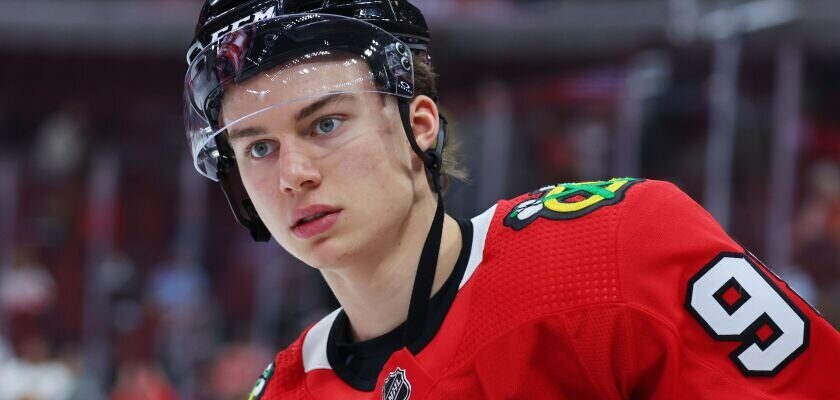Connor Bedard arrived in the NHL with the kind of hype rarely seen, carrying the weighty tag of “generational talent.” His rookie season demonstrated flashes of brilliance, undeniable skill, and the potential to be the cornerstone the Chicago Blackhawks desperately needed for their rebuild. However, two seasons into his professional career, a critical question looms large: Are the Blackhawks doing enough to support their young superstar?
While Bedard`s talent is clear, his sophomore season statistics, including a slight dip in scoring pace compared to his rookie year and persistent struggles with faceoffs and plus/minus ratings, highlight the immense challenges he faces. These aren`t necessarily indictments of Bedard himself, but rather symptoms of the environment he`s in – one conspicuously lacking in established, high-caliber teammates to share the load.
The Bedard Paradox: Solo Stardom in a Team Sport
Hockey, despite the focus on individual stars, is fundamentally a team sport. Historically, many “generational” players entering the league have benefited from starting alongside existing stars or quickly acquired, high-impact teammates. Think of **Wayne Gretzky** finding himself with the likes of Mark Messier (later in his career, but the *idea* of co-stars), **Sidney Crosby** with Evgeni Malkin, or **Connor McDavid** with Leon Draisaitl. These pairings allowed the young phenom to flourish without being the *only* target of opposition defenses and provided valuable mentorship and support.
Bedard, currently, doesn`t have that luxury. He`s effectively navigating the demanding landscape of the NHL on his own island, absorbing the full attention of opponents night after night. While prospects like Frank Nazar, Artyom Levshunov, and Anton Frondell represent exciting future pieces, they are not yet the established, veteran presence or prime-aged talents capable of immediately elevating Bedard`s line and taking significant pressure off his shoulders.
Past Attempts and Present Limitations
The Blackhawks made efforts to add veteran help last summer, bringing in players like Teuvo Teravainen, Tyler Bertuzzi, Alec Martinez, and TJ Brodie. The results, however, were lukewarm at best. Martinez retired, Brodie was bought out, and the offensive contributions from the forwards were moderate. It seems the intended support structure didn`t solidify, leaving Bedard still searching for consistent linemates who can complement his elite offensive instincts.
Compounding the issue is the current state of the free-agent market. Despite possessing a significant amount of cap space – over $22 million – the 2024 free agency period didn`t offer many high-impact players who fit the Blackhawks` needs or timeline. This leaves Chicago management in a difficult position: immense financial flexibility with limited viable options for immediate upgrades via free agency.
Looking Ahead: Trade or Wait?
This scenario forces the Blackhawks to consider alternative routes. One path is the trade market, which could potentially yield the kind of established player Bedard needs *now*. However, acquiring such talent via trade often comes at a premium cost in terms of prospects or draft picks, assets the Blackhawks are understandably hesitant to move in the early stages of their rebuild. There`s also the risk that any acquired player might not mesh or perform as hoped, repeating the outcomes of previous veteran additions.
The other path involves patience, potentially waiting until the summer of 2026 when the free-agent class is projected to be much stronger. The allure of playing alongside a prime Bedard could be a significant draw for top players. But can the Blackhawks afford to wait another two seasons, potentially leaving Bedard to shoulder the primary offensive burden during crucial developmental years? There`s a fine line between a patient rebuild and leaving your most valuable asset overly exposed.
The Comparison Point: San Jose`s Approach
A notable comparison emerges with the San Jose Sharks and their recent top pick, Macklin Celebrini. San Jose strategically acquired a reliable veteran center, Alex Wennberg, who absorbed difficult matchups and significant faceoff duties, effectively insulating Celebrini during his rookie season. Furthermore, the Sharks have promising young forwards like Will Smith and William Eklund developing alongside Celebrini, seemingly building a more cohesive young core around their star center sooner than the Blackhawks appear to be doing around Bedard.
While the Blackhawks have their own promising prospects, the apparent lack of a clear, immediate supporting cast around Bedard feels more pronounced when viewed through the lens of San Jose`s strategy. It suggests a potential difference in approach regarding the urgency and method of supporting the top prospect.
Conclusion: Time for Action is Approaching
Connor Bedard`s talent is undeniable, a beacon of hope for the Blackhawks franchise. But individual brilliance can only carry a team so far, especially in a league as competitive as the NHL. The Chicago Blackhawks have the cap space and the central piece of their future, but they critically need to add significant talent around Bedard – and soon. Whether through a calculated trade or positioning themselves aggressively for future free agency, the clock is ticking. The goal isn`t just to have a superstar; it`s to build a winning team *with* that superstar at its core, ensuring his immense potential translates into team success before the weight of carrying the franchise alone becomes too heavy.









